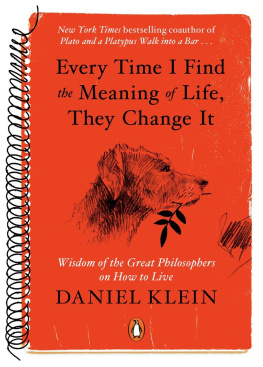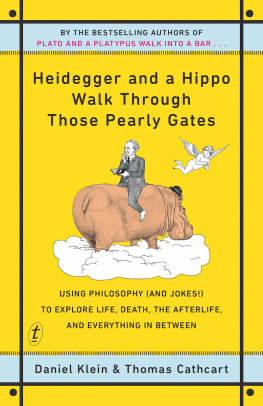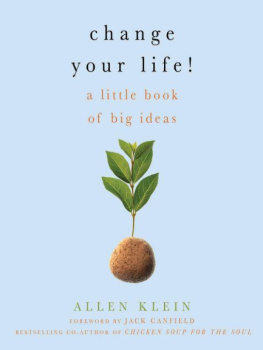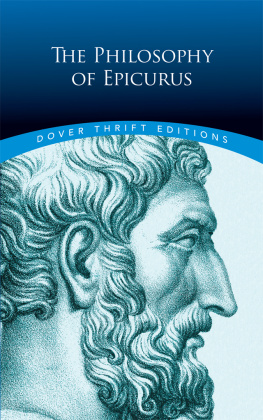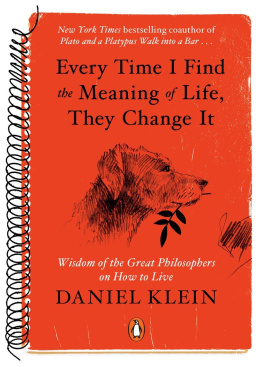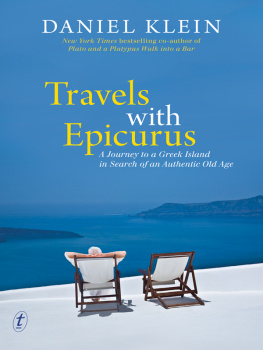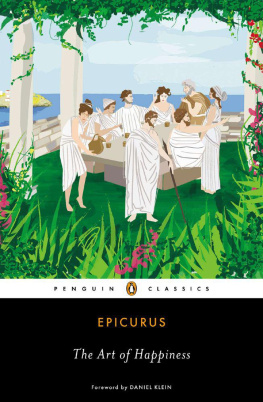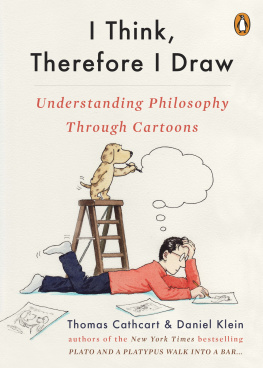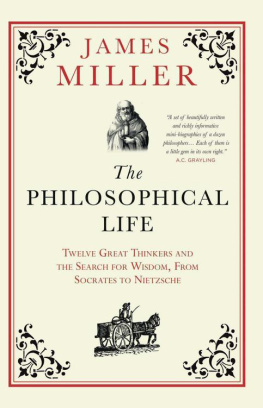PENGUIN BOOKS
EVERY TIME I FIND THE MEANING OF LIFE, THEY CHANGE IT
DANIEL KLEIN is the author of the London Times bestseller Travels with Epicurus and, with Thomas Cathcart, the New York Times and international bestseller Plato and a Platypus Walk into a Bar. A graduate of Harvard in philosophy, he lives in Western Massachusetts with his wife, Freke Vuijst.
PENGUIN BOOKS
An imprint of Penguin Random House LLC
375 Hudson Street
New York, New York 10014
penguin.com
Copyright 2015 by Daniel Klein
Penguin supports copyright. Copyright fuels creativity, encourages diverse voices, promotes free speech, and creates a vibrant culture. Thank you for buying an authorized edition of this book and for complying with copyright laws by not reproducing, scanning, or distributing any part of it in any form without permission. You are supporting writers and allowing Penguin to continue to publish books for every reader.
Excerpt from Listen Here, written by Dave Frishberg. 1981 Swiftwater Music (ASCAP) and MTM Music (ASCAP). All rights reserved. Used by permission.
Excerpt from This be the verse from The Complete Poems of Philip Larkin, edited by Archie Burnett. Copyright 2012 by The Estate of Philip Larkin. Reprinted by permission of Farrar, Straus and Giroux, LLC.
LIBRARY OF CONGRES S CATALOGING - IN - PUBL ICATION DATA
Klein, Daniel M., 1939
Every time I find the meaning of life, they change it : wisdom of the great philosophers on how to live / Daniel Klein.
pages cm
ISBN 978-0-698-18261-5
1. Life. 2. LifeQuotations, maxims, etc. I. Title.
BD431.K5835 2015
128dc23
2015015849
Cover design and illustration: The Heads of State
Version_1
For
Samara, Daniel, and Eliana
Their turn.
Every time I find the meaning of life, they change it.
______
REINHOLD NIEBUHR, AMERICAN SOCIAL PHILOSOPHER AND THEOLOGIAN
Prologue
N OT LONG AGO WHILE PACKING AWAY SOME BO OKS , I CAME ACROSS an old notebook labeled Pithies. Inside were short quotes from philosophers that I had jotted down, one per page, most with barely legible comments scribbled below them.
I had to smile. I had almost forgotten about this little collection of mine. The first entries bore the unmistakable blots and smudges of ink from a fountain pennotes to myself written some fifty years ago with the pen given to me by my parents as a high school graduation gift. I must have been nineteen or twenty then and had just decided to major in philosophy in college.
The reason for that decisionand for this notebookwas that I had hoped to find some guidance from the great philosophers on how best to live my life. At the time, I didnt have a clue as to what I wanted to do after college; basically all I knew was that I didnt want to be a doctor, lawyer, or businessman, eliminations that put me in a distinct minority of my classmates. I figured studying philosophy would be just the ticket to give me direction.
About halfway through that notebook, my notations switched to ballpoint pen and my comments on the philosophers quotes dwindled to just a few words, like Theres got to be a better way and Help! The final entry was from the theologian Reinhold Niebuhr: Every time I find the meaning of life, they change it. Under it I had scribbled, Now you tell me! I must have been in my midthirties when I closed the book on Pithies.
My first reaction when I leafed through the notebook these decades later was to cringe at how nave I had been. Did I really think I could learn how to live my life from philosophers, many of whom had lived thousands of years ago? What could I have been thinking?
Tips on how to live were few and far between in the philosophy texts I read as a student. Other questions needed to be answered first, such as, How can we know what is true? and, Is there a rational basis for ethical principles? and, What is the meaning of meaning? After all, it made no sense to wonder about the meaning of life, mine or anybody elses, if I didnt know what meaning meant.
True. But in the meantime graduation was swiftly approaching, my adult life was about to begin in earnest, and I was desperate for some hints on what to do next. In the following years I dropped in and out of a couple of graduate schools of philosophy and supported myself by writing quiz questions and stunts for TV game shows, routines for stand-up comedians, and mystery novels. I also traveled a lot, usually lugging along a few philosophy books. I was still looking for ideas on how to live the best life.
Here and there, I did find some truly evocative hints and jotted them down in my increasingly tattered notebookthat is, right up to the point when it struck me that I was on a nafs mission and I tucked Pithies into a box along with some old schoolbooks. That may have been around the same time I heard John Lennon famously declare, Life is what happens to you while you are busy making other plans.
The question of how to live the best possible life had once been the central question of philosophy. It certainly had been what thinkers like Aristippus, Epicurus, Socrates, Plato, and Aristotle had foremost on their minds. And in ensuing centuries, it was the fundamental question of a great variety of philosophers, from Humanists to Deists to Existentialists.
But in recent Western philosophy, the how-to-live question has pretty much taken a backseat to the questions of epistemology (How can we know what is real and true?) and logic (What are the necessary principles of reason and rational discourse?). With a few gratifying exceptions, contemporary academic philosophers leave the whole how-to-live business to daytime TV talk show hosts, smartly dressed motivational speakers, and pop gurus who tend to favor flowing robes. According to the academics, seeking an answer to the how-to-live question is definitely not the enterprise of any self-respecting modern philosopher.
Thats unfortunate, I thought, looking through my old notebook. After initially scoffing at my youthful navet, I now realized that those how-to-live questions were still very much alive in my mind. Sure, time had crept on and my life, with its ups and downs, had simply happened, as lives tend to do, but my appetite for philosophical ideas about life had not diminished in the least. In fact, as I look at life from the vantage point of my eighth decade, my hankering for such ideas has only increased. Late in the game as it may be, I still want to live my final years the best way I can. But more compellingly, I find myself at that stage of life when I want to give my personal history one last look-through, and I am curious to see how it measures up to fully considered ideas of a good life.
So, forty years after my last entry in Pithies, I started jotting down new thoughts about those philosophers quotes I had long ago copied in that notebook. And then I started collecting new quotes and noodling about them, too. Truth to tell, I was having a grand old time.
Some of these quotes sum up an entire philosophical position about how to live while others simply lob a provocative curveball in my direction, but all of them dazzle me now that I ponder them from this end of life. I am struck anew by how eloquent and inspiring great philosophers can be with just a few well-chosen words. I also realize that at my age one advantage of a concise philosophical statement is that I can still remember its beginning when I get to its end.

